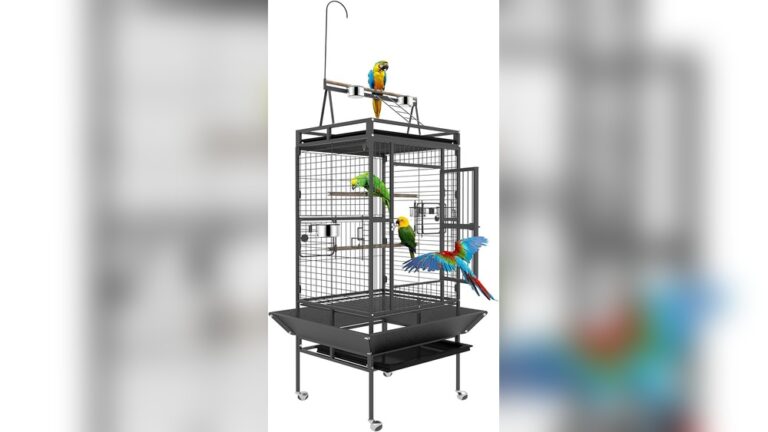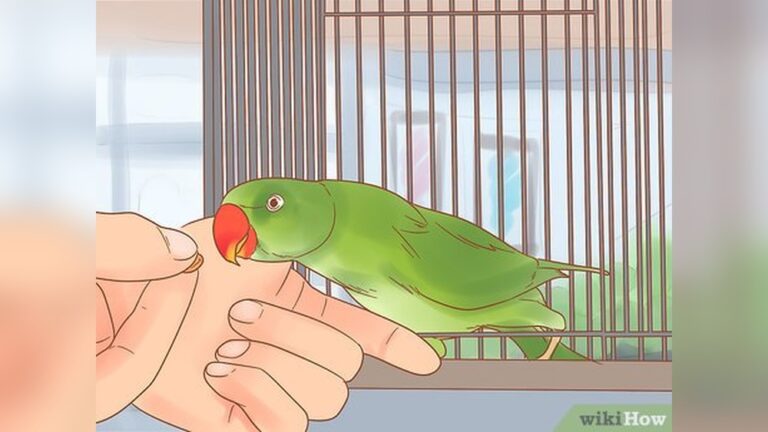African Grey Parrot Care
If you have an African Grey Parrot or are thinking about bringing one into your home, you want to make sure you’re giving it the best care possible. These birds are incredibly smart and full of personality, but they also need special attention to stay happy and healthy.
Understanding their unique needs can make all the difference in your parrot’s life—and your bond with it. Keep reading, and you’ll discover simple, effective tips that will help you take care of your African Grey Parrot like a pro. Your feathered friend will thank you!
Choosing An African Grey Parrot
Choosing an African Grey Parrot is a special decision. These birds are smart and loving pets. Picking the right one takes care and thought. Knowing what to look for helps you find a healthy and happy bird. This guide covers key points for choosing your African Grey Parrot.
Selecting A Healthy Bird
Check the bird’s eyes. Bright, clear eyes mean good health. Avoid birds with watery or dull eyes. Look at the feathers. They should be smooth and clean. Ragged or missing feathers show stress or illness. Listen to the bird’s breathing. It should be quiet and easy. Watch for sneezing or coughing. These signs point to health problems.
Understanding Age And Gender Differences
Young African Greys are playful but need more care. Adult birds are calmer and easier to train. Age affects their behavior and needs. Gender can change the bird’s personality. Males often talk more and are social. Females might be quieter but very loyal. Knowing these differences helps match the bird to your lifestyle.
:strip_icc()/facts-about-african-grey-parrots-390715_Final2-resized-eb37a4cb7f244b3cb4f6b1818d6b4ee6.jpg)
Credit: www.thesprucepets.com
Housing Requirements
Providing the right housing for your African Grey Parrot is key to its health and happiness. A safe, comfortable space helps your bird feel secure and active. Good housing also supports natural behaviors like climbing and chewing.
Understanding the needs for cage size, placement, and enriching items will help you create a perfect home for your parrot.
Cage Size And Placement
Choose a cage that is large enough for your African Grey to move freely. Minimum dimensions should be 36 inches wide, 24 inches deep, and 48 inches high. Bigger cages allow more flying and stretching.
Place the cage in a quiet, well-lit area away from drafts and direct sunlight. Your parrot enjoys being near family activity but also needs calm time. Avoid kitchens to reduce exposure to fumes and smoke.
Perches And Toys
Provide several perches of different thicknesses and textures to keep feet healthy. Natural wood perches work best and help trim nails naturally.
Toys are essential to prevent boredom and encourage mental exercise. Include chew toys, puzzle toys, and swings. Rotate toys often to keep your parrot interested and happy.
Diet And Nutrition
African Grey Parrots need a healthy diet for a long, happy life. Their food must provide all the important nutrients. A good diet keeps their feathers bright and their minds sharp. Feeding them the right food supports their strong immune system and energy.
Balanced Food Choices
Offer a mix of fresh fruits, vegetables, and quality pellets. Pellets should make up about 70% of their diet. Include leafy greens like kale and spinach for vitamins. Fruits such as apples, pears, and berries add natural sweetness. Avoid avocado, chocolate, and caffeine as they are toxic. Fresh water must always be available and changed daily.
Supplements And Treats
Vitamin supplements may help if your parrot lacks variety. Calcium is important for bone health and beak strength. Use treats sparingly to prevent obesity. Nuts like almonds and walnuts make good occasional snacks. Avoid salty or sugary treats that harm their health. Treats can also be used for training and bonding moments.
Daily Care Routine
Taking care of an African Grey Parrot every day is important for its health and happiness. A simple routine helps keep your bird safe and cheerful. Consistency in daily care builds trust and makes your parrot feel loved. Small tasks done daily add up to a strong bond.
Cleaning And Maintenance
Clean the cage daily to avoid germs and bad smells. Remove old food and droppings. Wash food and water bowls with warm water. Replace the water with fresh, clean water every day. Check toys and perches for dirt and clean them regularly. Keep the cage in a dry, well-ventilated place.
Exercise And Interaction
Give your African Grey time outside the cage daily. Let it fly or climb safely in a secure room. Play with your parrot to keep its mind active. Talk, whistle, or teach simple words. Use toys that encourage chewing and problem-solving. Regular exercise helps your bird stay strong and happy.
Training And Socialization
Training and socialization are key to a happy African Grey Parrot. These birds are smart and need mental challenges. They enjoy learning new things and interacting with people. Proper training helps them behave well and reduces stress. Socialization makes them friendly and confident around others.
Basic Commands
Start with simple commands like “step up” and “step down.” Use a calm voice and gentle hand gestures. Repeat commands often for better learning. Reward your parrot with treats or praise when it follows commands. Keep training sessions short to hold their attention. Patience and consistency are very important.
Building Trust
Trust forms the base of good training. Spend time near your parrot without forcing interaction. Talk softly and offer treats to create positive feelings. Let your parrot explore your hand at its own pace. Avoid sudden moves or loud sounds that may scare it. Trust grows slowly but leads to a strong bond.

Credit: zupreem.com
Common Health Issues
African Grey Parrots are strong birds but can face health problems. Knowing common health issues helps keep them safe and happy. Early care prevents serious illness and improves their life quality.
Signs Of Illness
Watch for changes in behavior or eating habits. A sick parrot may become quiet or less active. Ruffled feathers or a droopy stance can signal trouble. Check their droppings for unusual color or texture. Breathing problems like wheezing or tail bobbing need attention. Loss of appetite and weight loss are serious signs. Notice any swelling, discharge, or wounds on the body. Early detection saves lives.
Preventive Care
Keep the cage clean to avoid infections. Provide fresh water and a balanced diet daily. Regular vet check-ups catch problems early. Offer toys and exercise to reduce stress. Avoid sudden changes in temperature or surroundings. Quarantine new birds before introducing them to others. Good hygiene and care lower disease risk. Prevention is easier than treatment.
Behavioral Challenges
African Grey parrots are smart and social birds. They can show some tough behaviors. These behaviors need patience and care. Understanding these challenges helps keep your parrot happy. It also makes your bond stronger.
Dealing With Screaming
Screaming is a common problem. African Greys use loud calls to get attention. They might scream when bored or scared. Watch for triggers like loud noises or loneliness. Give your parrot toys and company to reduce screams. Use calm voices to soothe your bird. Avoid yelling back, as it worsens the noise. Consistent routines help your parrot feel safe. Over time, the screaming will lessen.
Managing Feather Plucking
Feather plucking means your bird pulls out its feathers. This can happen from stress or illness. Check the cage size and cleanliness first. A small or dirty cage causes discomfort. Offer fresh food and water every day. Keep your parrot busy with toys and puzzles. Spend time talking and playing to reduce stress. If plucking continues, see a vet for help. Early care stops serious damage to feathers and skin.
Travel And Relocation Tips
Moving an African Grey Parrot to a new place needs careful planning. These birds are smart and sensitive. They can get stressed easily from changes. Travel and relocation tips help keep your parrot calm and safe during the move.
Safe Transport Methods
Use a sturdy travel cage with secure locks. The cage should be big enough for the bird to stand and turn. Line the bottom with soft paper or towel. Avoid tight spaces that cause discomfort.
Keep the cage covered with a light cloth to reduce stress. Carry fresh water and food on hand. Check the temperature and avoid extreme heat or cold. Drive carefully or choose a calm mode of transport.
Adjusting To New Environments
Set up the cage in a quiet corner at first. Let your parrot explore slowly at its own pace. Keep familiar toys and perches inside the cage. This gives comfort and a sense of home.
Speak softly and spend time near the bird. New sounds and smells can be scary. Give your parrot time to settle before expecting normal behavior. Regular feeding and attention help build trust again.

Credit: www.greeleypetvet.com
How Smart Pets Lover Can Help You with African Grey Parrot Care
Learning Through Everyday African Grey Parrot Care
Caring for an African Grey Parrot is more than just a routine—it’s a continuous learning journey that deepens your bond and understanding of these intelligent birds. From setting up their ideal housing to managing diet and nutrition, each step offers a chance to tune into their unique needs and behaviors.
For instance, observing how your parrot responds during training and socialization sessions can teach you patience and effective communication. Noticing subtle signs of common health issues helps you become proactive rather than reactive, ensuring your feathered friend thrives. These practical experiences align with Smart Pets Lover’s mission to empower pet parents with confidence and connection.
- Keep a journal of daily care routines and behavioral changes
- Research and adapt nutrition plans based on your parrot’s preferences and health
- Join community forums or reach out to avian veterinarians for expert advice
Remember, every chirp and gesture is a story waiting to be understood. For more in-depth guidance, you can contact avian specialists at your local vet clinic or explore resources available through Smart Pets Lover’s network. This hands-on approach transforms care into a rewarding learning experience.
Frequently Asked Questions
How Often Should I Feed My African Grey Parrot?
Feed your African Grey Parrot twice daily with a balanced diet. Include pellets, fresh fruits, vegetables, and nuts. Avoid excessive seeds and sugary treats to maintain optimal health and weight.
What Is The Ideal Cage Size For African Grey Parrots?
Choose a cage at least 24x24x36 inches to allow free movement. Ensure bar spacing is ¾ to 1 inch for safety. Add perches and toys to keep your parrot active and happy.
How Do I Prevent Feather Plucking In African Grey Parrots?
Provide mental stimulation with toys and social interaction daily. Maintain a consistent routine and a clean environment. Address stress, boredom, or medical issues promptly to reduce feather plucking risks.
Can African Grey Parrots Talk And Mimic Sounds?
Yes, African Grey Parrots are excellent mimics and can learn many words. They require regular social interaction and training to develop their speaking skills. Patience and consistency improve their vocabulary.
Conclusion
Caring for an African Grey parrot takes time and patience. These birds need love, attention, and a proper diet. Regular exercise keeps them healthy and happy. Clean cages prevent illness and stress. Talking and playing help build strong bonds. Understanding their needs makes life better for both of you.
Enjoy their intelligence and companionship every day. Keep learning and stay committed to their care. Your effort will bring joy and trust. A happy parrot means a happy home.







